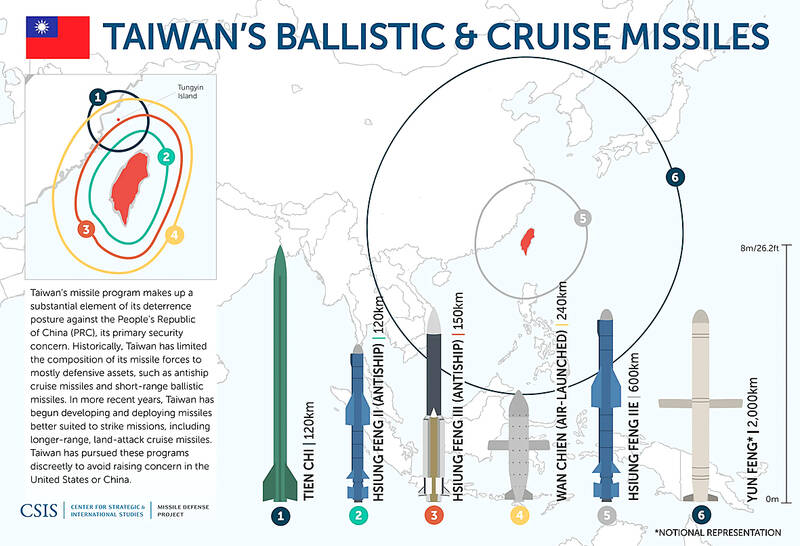Former Chungshan Institute of Science and Technology (CSIST) president Kung Chia-cheng (龔家政) made known some behind-the-scenes details of the nation’s missile development in a memoir published by Academia Sinica’s Institute of Modern History last month.
Speaking about the supersonic cruise missile developed by the Yun Feng (雲峰, Cloud Peak) project, Kung said the missile could exceed Mach 3 and had excellent penetration, as it comes down on its target vertically.
The missile’s speed ensures that it is not easily intercepted, and at the time of the missile’s development, under former president Lee Teng-hui (李登輝), only the US and Russia were developing similar kinds of missiles, Kung said.

Photo: screen grab from CSIS Web site
The Ministry of National Defense had nearly axed the project as it thought the missile would have a high possibility of failing its trial launch, he said.
Fortunately, former president Chen Shui-bian (陳水扁) had conducted an inspection of CSIST during his presidency, and the institute briefed the president and received support to continue the project, he added.
Nearly 400 CSIST members worked on a secret project to develop ballistic missile capabilities under the overarching “Tien Kung” project. It was the first time that Taiwan developed a missile that was 1m in diameter and 10m in height, Kung said, adding that Chen was impressed when he inspected the missile at Pingtung County’s Jiupengwan (九鵬灣) missile test base.
The American Institute in Taiwan met with Chen soon after the trial launch of the missile, he said, adding that the institute issued a memorandum of understanding stating that we “were not allowed to have carried out the trial launch.”
Kung said that even if the project had been successful, it would simply have been a demonstration that the CSIST could make ballistic missiles, and it would have taken more trials for the project to produce combat-ready weapons.
Kung also spoke about the Hsiung Feng II-E missile, which has two variants: type A, which has a range of 500km, and type B, which has a range of 1,000km.
Officials had been pleased with the successful results of the Hsiung Feng II-E type B simulation, he said.

Taiwan has received more than US$70 million in royalties as of the end of last year from developing the F-16V jet as countries worldwide purchase or upgrade to this popular model, government and military officials said on Saturday. Taiwan funded the development of the F-16V jet and ended up the sole investor as other countries withdrew from the program. Now the F-16V is increasingly popular and countries must pay Taiwan a percentage in royalties when they purchase new F-16V aircraft or upgrade older F-16 models. The next five years are expected to be the peak for these royalties, with Taiwan potentially earning

STAY IN YOUR LANE: As the US and Israel attack Iran, the ministry has warned China not to overstep by including Taiwanese citizens in its evacuation orders The Ministry of Foreign Affairs (MOFA) yesterday rebuked a statement by China’s embassy in Israel that it would evacuate Taiwanese holders of Chinese travel documents from Israel amid the latter’s escalating conflict with Iran. Tensions have risen across the Middle East in the wake of US and Israeli airstrikes on Iran beginning Saturday. China subsequently issued an evacuation notice for its citizens. In a news release, the Chinese embassy in Israel said holders of “Taiwan compatriot permits (台胞證)” issued to Taiwanese nationals by Chinese authorities for travel to China — could register for evacuation to Egypt. In Taipei, the ministry yesterday said Taiwan

Taiwan is awaiting official notification from the US regarding the status of the Agreement on Reciprocal Trade (ART) after the US Supreme Court ruled US President Donald Trump's global tariffs unconstitutional. Speaking to reporters before a legislative hearing today, Premier Cho Jung-tai (卓榮泰) said that Taiwan's negotiation team remains focused on ensuring that the bilateral trade deal remains intact despite the legal challenge to Trump's tariff policy. "The US has pledged to notify its trade partners once the subsequent administrative and legal processes are finalized, and that certainly includes Taiwan," Cho said when asked about opposition parties’ doubts that the ART was

If China chose to invade Taiwan tomorrow, it would only have to sever three undersea fiber-optic cable clusters to cause a data blackout, Jason Hsu (許毓仁), a senior fellow at the Hudson Institute and former Chinese Nationalist Party (KMT) legislator, told a US security panel yesterday. In a Taiwan contingency, cable disruption would be one of the earliest preinvasion actions and the signal that escalation had begun, he said, adding that Taiwan’s current cable repair capabilities are insufficient. The US-China Economic and Security Review Commission (USCC) yesterday held a hearing on US-China Competition Under the Sea, with Hsu speaking on